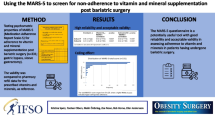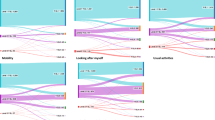Abstract
Purpose
In the oncology population where malnutrition prevalence is high, more descriptive screening tools can provide further information to assist triaging and capture acute change. The Patient-Generated Subjective Global Assessment Short Form (PG-SGA SF) is a component of a nutritional assessment tool which could be used for descriptive nutrition screening. The purpose of this study was to conduct a secondary analysis of nutrition screening and assessment data to identify the most relevant information contributing to the PG-SGA SF to identify malnutrition risk with high sensitivity and specificity.
Methods
This was an observational, cross-sectional study of 300 consecutive adult patients receiving ambulatory anti-cancer treatment at an Australian tertiary hospital. Anthropometric and patient descriptive data were collected. The scored PG-SGA generated a score for nutritional risk (PG-SGA SF) and a global rating for nutrition status. Receiver operating characteristic curves (ROC) were generated to determine optimal cut-off scores for combinations of the PG-SGA SF boxes with the greatest sensitivity and specificity for predicting malnutrition according to scored PG-SGA global rating.
Results
The additive scores of boxes 1–3 had the highest sensitivity (90.2 %) while maintaining satisfactory specificity (67.5 %) and demonstrating high diagnostic value (AUC = 0.85, 95 % CI = 0.81–0.89). The inclusion of box 4 (PG-SGA SF) did not add further value as a screening tool (AUC = 0.85, 95 % CI = 0.80–0.89; sensitivity 80.4 %; specificity 72.3 %).
Conclusions
The validity of the PG-SGA SF in chemotherapy outpatients was confirmed. The present study however demonstrated that the functional capacity question (box 4) does not improve the overall discriminatory value of the PG-SGA SF.
Similar content being viewed by others
References
Isenring E, Zabel R, Bannister M, Brown T, Findlay M, Kiss N, Loeliger J, Johnstone C, Camilleri B, Davidson W, Hill J, Bauer J (2013) Updated evidence-based practice guidelines for the nutritional management of patients receiving radiation therapy and/or chemotherapy. Nutr Dietetics 70(4):312–324. doi:10.1111/1747-0080.12013
Bauer J, Capra S, Ferguson M (2002) Use of the Scored Patient-Generated Subjective Global Assessment (PG-SGA) as a nutrition assessment tool in patients with cancer. Eur J Clin Nutr 56(8):779–785. doi:10.1038/sj.ejcn.1601412
Isenring E, Cross G, Kellett E, Koczwara B, Daniels L (2010) Nutritional status and information needs of medical oncology patients receiving treatment at an Australian public hospital. Nutr Cancer 62(2):220–228. doi:10.1080/01635580903305276
Evidence based practice guidelines for the nutritional management of malnutrition in adult patients across the continuum of care (2009). Nutrition & Dietetics 66:S1-S34. doi:10.1111/j.1747-0080.2009.01383.x
Bauer JD, Ash S, Davidson WL, Hill JM, Brown T, Isenring EA, Reeves M (2006) Evidence based practice guidelines for the nutritional management of cancer cachexia. Nutr Dietetics 63:S3–S32. doi:10.1111/j.1747-0080.2006.00099.x
Skipper A, Ferguson M, Thompson K, Castellanos VH, Porcari J (2012) Nutrition screening tools: an analysis of the evidence. JPEN J Parenter Enteral Nutr 36(3):292–298. doi:10.1177/0148607111414023
Ferguson ML, Bauer J, Gallagher B, Capra S, Christie DR, Mason BR (1999) Validation of a malnutrition screening tool for patients receiving radiotherapy. Australas Radiol 43(3):325–327
Rubenstein LZ, Harker JO, Salva A, Guigoz Y, Vellas B (2001) Screening for undernutrition in geriatric practice: developing the short-form mini-nutritional assessment (MNA-SF). J Gerontol A Biol Sci Med Sci 56(6):M366–M372
Kondrup J, Rasmussen HH, Hamberg O, Stanga Z (2003) Nutritional risk screening (NRS 2002): a new method based on an analysis of controlled clinical trials. Clin Nutr 22(3):321–336
Gabrielson DK, Scaffidi D, Leung E, Stoyanoff L, Robinson J, Nisenbaum R, Brezden-Masley C, Darling PB (2013) Use of an abridged Scored Patient-Generated Subjective Global Assessment (abPG-SGA) as a nutritional screening tool for cancer patients in an outpatient setting. Nutr Cancer 65(2):234–239. doi:10.1080/01635581.2013.755554
Vigano AL, di Tomasso J, Kilgour RD, Trutschnigg B, Lucar E, Morais JA, Borod M (2014) The abridged Patient-Generated Subjective Global Assessment is a useful tool for early detection and characterization of cancer cachexia. J Acad Nutr Diet 114(7):1088–1098. doi:10.1016/j.jand.2013.09.027
Abbott J, Teleni L, McKavanagh D, Watson J, McCarthy A, Isenring E (2014) A novel, automated nutrition screening system as a predictor of nutritional risk in an oncology day treatment unit (ODTU). Support Care Cancer 22(8):2107–2112. doi:10.1007/s00520-014-2210-7
Bauer J, Capra S (2003) Comparison of a malnutrition screening tool with subjective global assessment in hospitalised patients with cancer–sensitivity and specificity. Asia Pac J Clin Nutr 12(3):257–260
Isenring E, Bauer J, Capra S (2003) The Scored Patient-Generated Subjective Global Assessment (PG-SGA) and its association with quality of life in ambulatory patients receiving radiotherapy. Eur J Clin Nutr 57(2):305–309. doi:10.1038/sj.ejcn.1601552
Detsky AS, McLaughlin JR, Baker JP, Johnston N, Whittaker S, Mendelson RA, Jeejeebhoy KN (1987) What is subjective global assessment of nutritional status? JPEN J Parenter Enteral Nutr 11(1):8–13
Healy E, Yaxley A, Isenring E, Bannerman E, Miller M (2014) Ability of existing malnutrition screening tools to identify risk of starvation, sarcopenia and cachexia: a systematic review. e-SPEN. Journal 9(3):e109–e122. doi:10.1016/j.clnme.2014.04.005
Isenring EA, Banks M, Ferguson M, Bauer JD (2012) Beyond malnutrition screening: appropriate methods to guide nutrition care for aged care residents. J Acad Nutr Diet 112(3):376–381. doi:10.1016/j.jada.2011.09.038
Stata Statistical Software (2013) Release, 13 edn. StataCorp LP, TX
Campbell KL, Bauer JD, Ikehiro A, Johnson DW (2013) Role of nutrition impact symptoms in predicting nutritional status and clinical outcome in hemodialysis patients: a potential screening tool. J Ren Nutr 23(4):302–307. doi:10.1053/j.jrn.2012.07.001
Davidson W, Teleni L, Muller J, Ferguson M, McCarthy AL, Vick J, Isenring E (2012) Malnutrition and chemotherapy-induced nausea and vomiting: implications for practice. Oncol Nurs Forum 39(4):E340–E345. doi:10.1188/12.onf.e340-e345
Khalid U, Spiro A, Baldwin C, Sharma B, McGough C, Norman AR, Eisen T, O’Brien ME, Cunningham D, Andreyev HJ (2007) Symptoms and weight loss in patients with gastrointestinal and lung cancer at presentation. Support Care Cancer 15(1):39–46. doi:10.1007/s00520-006-0091-0
Davies M (2005) Nutritional screening and assessment in cancer-associated malnutrition. Eur J Oncol Nurs 9(Suppl 2):S64–S73. doi:10.1016/j.ejon.2005.09.005
Pt-Global (2014) Pt-Global innovation in nutritional care. http://pt-global.org/. Accessed January 8 2015
Acknowledgments
This project was funded by the Dietitians Association of Australia (DAA) Small Grant 2013 and the Queensland Health Practitioner Research Grant Scheme 2013–2014.
Author’s contribution
All authors read and approved the final manuscript. JA carried out the study and prepared the manuscript. JA and LT were responsible for the conception and study design, statistical analysis and interpretation. DM advised on Charm software. EI, LT, AM, and DM provided interpretation and critical revision of the article. JA and JW participated in the acquisition of data and literature review. EI supervised the study.
Author information
Authors and Affiliations
Corresponding author
Ethics declarations
A written informed consent was obtained from all participants. The protocol (HREC/13/QPAH/110) received was approved by the Metro South Human Research Ethics Committee.
Conflict of interest
The authors declare that we have no conflicts of interest. We acknowledge that we have full control of all primary data and agree to allow the journal to review the data if requested.
Rights and permissions
About this article
Cite this article
Abbott, J., Teleni, L., McKavanagh, D. et al. Patient-Generated Subjective Global Assessment Short Form (PG-SGA SF) is a valid screening tool in chemotherapy outpatients. Support Care Cancer 24, 3883–3887 (2016). https://doi.org/10.1007/s00520-016-3196-0
Received:
Accepted:
Published:
Issue Date:
DOI: https://doi.org/10.1007/s00520-016-3196-0




